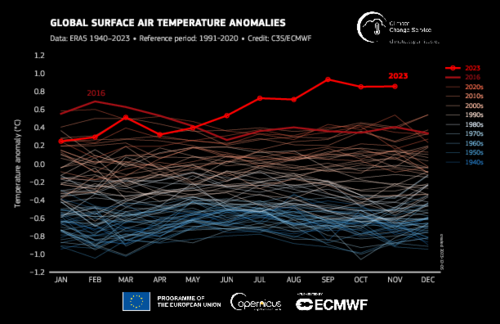Dass der Dezember daran noch etwas ändere, halten Wissenschaftler für ausgeschlossen. Das laufende Jahr wird laut dem EU-Erdbeobachtungsprogramm Copernicus global gesehen das wärmste seit Beginn der Aufzeichnungen Mitte des 19. Jahrhunderts. Es sei praktisch ausgeschlossen, dass der Dezember daran noch etwas ändere, teilte die Organisation mit. Das bislang wärmste Jahr war 2016.
Zuvor war bereits vermutet worden, dass 2023 einen Rekord bei den globalen Durchschnittstemperaturen aufstellt. So sprach die US-Klimabehörde NOAA Mitte November von einer Wahrscheinlichkeit von mehr als 99 Prozent, dass das Jahr das wärmste seit 1850 werde. Gänzlich festgelegt hatte sich bislang aber keine der relevanten Institutionen.
Mehr dazu auf: zeit.de
Lesen Sie dazu auch: Copernicus: November 2023 – Remarkable year continues, with warmest boreal autumn. 2023 will be the warmest year on record
The Copernicus Climate Change Service (C3S), implemented by the European Centre for Medium-Range Weather Forecasts on behalf of the European Commission with funding from the EU, routinely publishes monthly climate bulletins reporting on the changes observed in global surface air and sea temperatures, sea ice cover and hydrological variables. All the reported findings are based on computer-generated analyses and according to ERA5 dataset, using billions of measurements from satellites, ships, aircraft and weather stations around the world.
The figure on the right shows monthly global surface air temperature anomalies (°C) relative to 1991–2020 from January 1940 to November 2023, plotted as time series for each year. 2023 and 2016 are shown with thick lines shaded in bright red and dark red, respectively. Other years are shown with thin lines and shaded according to the decade, from blue (1940s) to brick red (2020s). Data source: ERA5.
All about November 2023 – Surface air temperature and sea surface temperature highlights: climate.copernicus.eu


